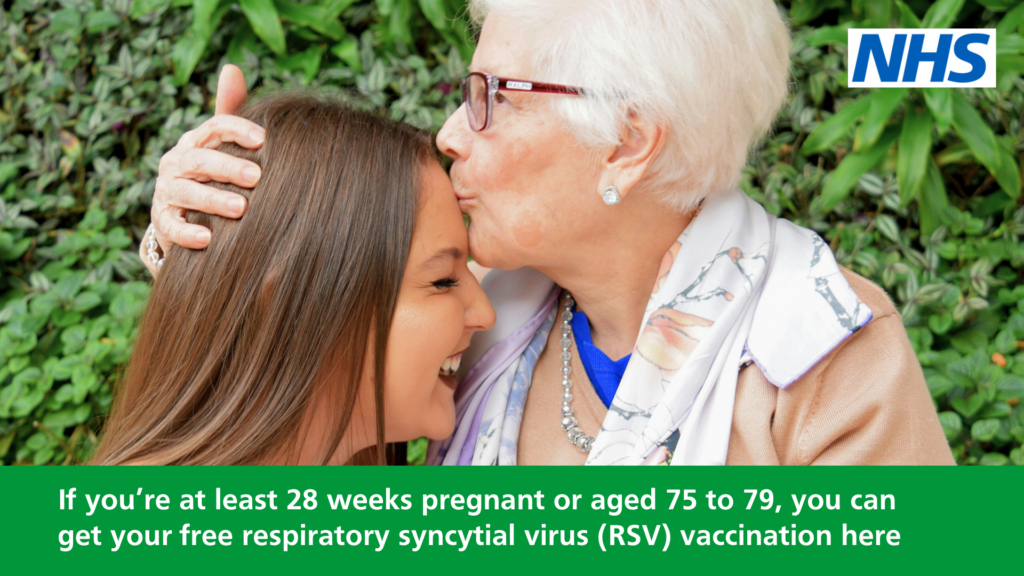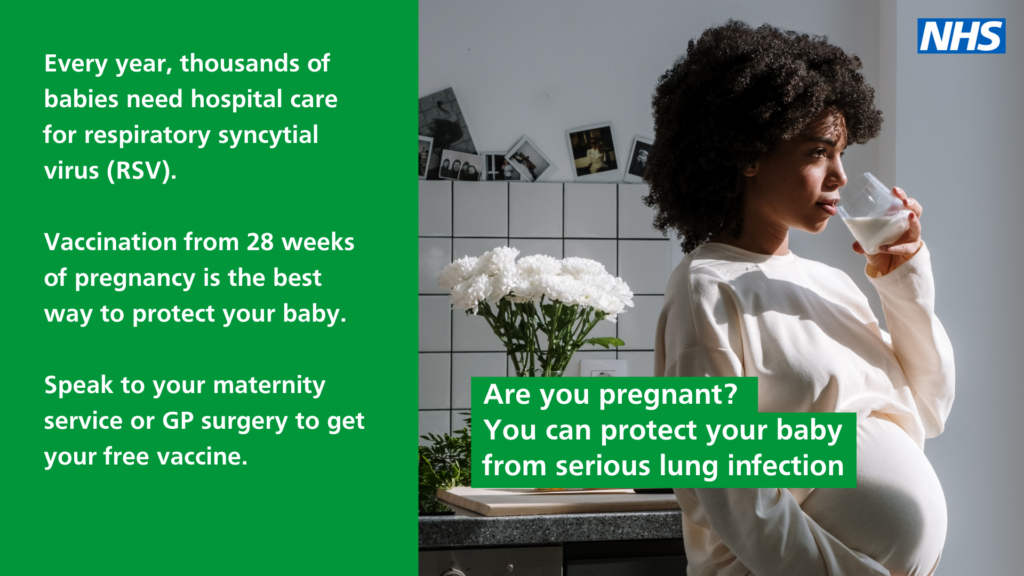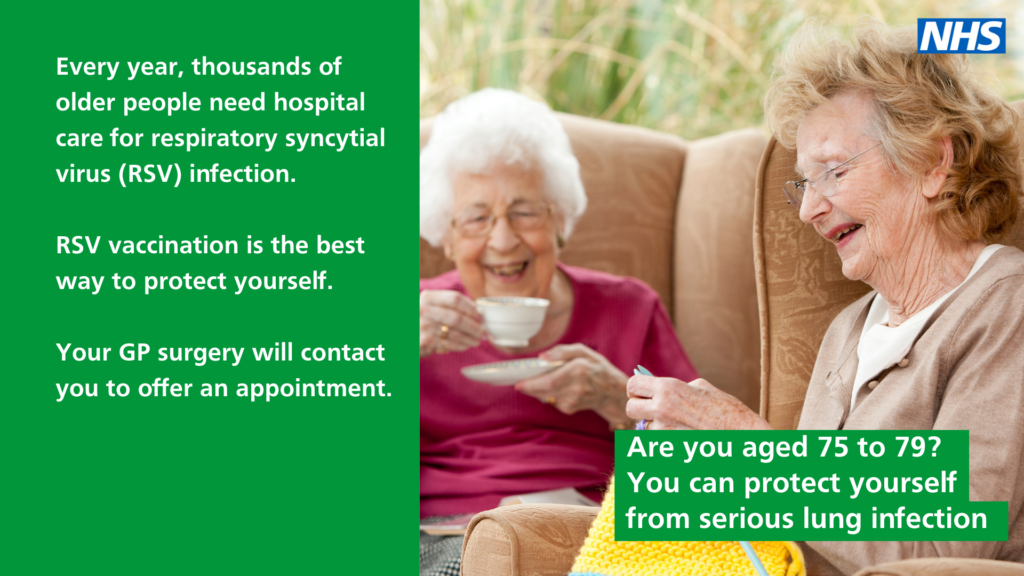Respiratory syncytial virus (RSV) is a major cause of respiratory illness in the UK but is relatively unknown to the public. It causes hundreds of thousands of infections across the UK each winter in the young and the old, resulting in illness (including pneumonia), admissions and deaths.
As of 1 September 2024, two new respiratory syncytial virus (RSV) vaccination programmes were introduced.
- A programme to protect infants by vaccinating pregnant women (from 28 weeks)
- A programme for older adults aged 75 to 79 years old
The aim of the programme is to reduce the incidence and severity of RSV disease, and hospitalisation as a result of RSV disease, in babies and eligible older adults. This UK-wide vaccination programmes will save lives and significantly reduce the burden on the NHS during the challenging winter months. You can read more HERE on the new vaccination programme in the press release from the Department of Health and Social Care published on 17 July 2024

What is RSV?
Respiratory syncytial virus (RSV) is an enveloped RNA virus, in the same family as the human parainfluenza viruses and mumps and measles viruses. RSV is one of the common viruses that cause coughs and colds in winter. RSV is transmitted by large droplets and by secretions from contact with an infected person.
It usually causes a mild self-limiting respiratory infection in adults and children but can be severe in infants and older adults who are at increased risk of acute lower respiratory tract infection. Infants aged less than 6 months frequently develop the most severe disease such as bronchiolitis and pneumonia, which may result in hospitalisation.
Previous infection by RSV may only confer partial immunity to RSV and so individuals may be infected repeatedly with the same or different strains of RSV. Older adults may become vulnerable to RSV due to age-related decline of parts of their immune system (T-cell immunosenescence)
Transmission of RSV
- RSV is highly communicable, but humans are the only known reservoir.
- The incubation period (time between infection and appearance of symptoms) varies from 2 to 8 days (usually 3 to 5 days).
- The virus is spread from respiratory secretions following close contact with an infected person via respiratory droplets or contact with contaminated surfaces or objects.
- The virus can survive on surfaces or objects for about 4 to 7 hours.
Treatment and prevention
There is no specific treatment suitable for RSV and treatment is therefore aimed at supporting the patient and relieving symptoms.
Transmission can be reduced through standard infection control practices such as respiratory hygiene, hand washing with soap and warm water, and cleaning of surfaces.
Ideally, people with colds should avoid close contact with vulnerable older adults, particularly those with weakened immune systems, and co-morbidities (particularly respiratory and cardiac disease).
Vaccines have now been developed which have been rigorously tested for safety and efficacy; Abrysvo® RSV vaccine (Pfizer Limited) was introduced into the UK schedule from 1st September 2024.
Vaccination through the routine offer of a single dose at age 75 years and the catch-up programme (of 75 to 79 year-olds) will help protect eligible older adults, particularly if given before winter RSV activity. The RSV vaccine protects for at least two years. Studies are ongoing to see how long it lasts.
RSV Vaccination in Pregnancy
Respiratory syncytial virus (RSV) can cause lung infections like bronchiolitis, making it difficult for newborn babies to breathe and causing 20,000 infants to need hospital treatment each year.
Pregnant women are eligible for a free respiratory syncytial virus (RSV) vaccine to protect their babies from serious lung infections.
You can get your vaccine from 28 weeks of pregnancy. Talk to your GP or maternity service to schedule yours. Read more HERE.

Text from above image:
Are you pregnant? You can protect your baby from serious lung infection. Every year, thousands of babies need hospital care for respiratory syncytial virus (RSV). Vaccination from 28 weeks of pregnancy is the best way to protect your baby. Speak to your maternity service of GP surgery to get your free vaccine.
RSV Vaccination in Older Adults
Whilst the burden of RSV is well understood in infants and children, the burden of RSV in older adults is comparatively poorly understood and considered to be underestimated by existing routine surveillance. Only a minority of adult infections are diagnosed as RSV is not widely recognised as a cause of respiratory infections in adults.
RSV has been estimated to account for 175,000 annual GP episodes in those age 65 years and older in the UK. It has been estimated in that in each winter season there are 4,000 deaths due to RSV in those aged over 75 years in England and Wales
Individuals will become eligible on their 75th birthday and remain eligible until aged 79 years and 364 days (that is, up until and including the day before their 80th birthday)
Clinically it is preferable to vaccinate as soon as possible after patients become eligible so that they are protected at the earliest opportunity. For those turning 75 years of age between March and October each year, the vaccine should ideally be given by the end of October before RSV activity increases soon after turning 75 if their birthday falls during the RSV season (November to February).
People aged 75-79 can get a free vaccination to protect themselves from respiratory syncytial virus (RSV), a common lung infection that can lead to serious illnesses like pneumonia.
The Atherstone Surgery are currently holding RSV vaccination clinics. These clinics by invite only but f you feel that you were due an invite and haven’t received one please contact the surgery on:
01827 713664
Read more about the RSV vaccination HERE.
 Text from above image:
Text from above image:
Are you aged 75 to 79? You can protect yourself from serious lung infection. Every year, thousands of older people need hospital care for respiratory syncytial virus (RSV). RSV vaccination is the best way to protect yourself. Your GP surgery will contact you to offer an appointment.